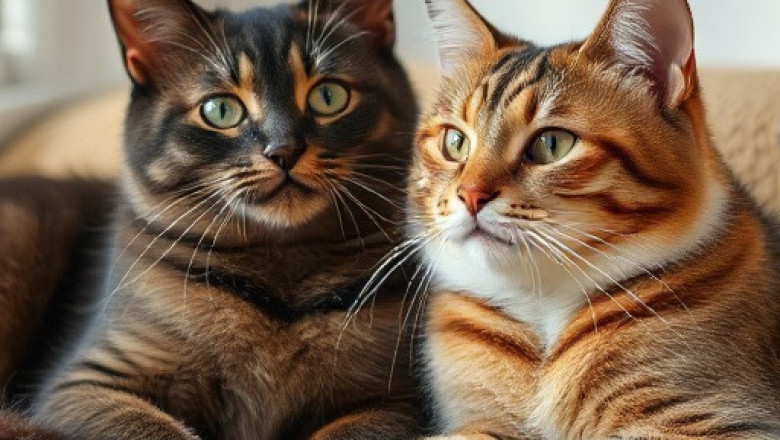How Long Does a Cat Hold a Grudge? A Complete Guide
Cats are known for their mysterious and sometimes aloof nature, which can make understanding their behavior a bit of a challenge. One intriguing question many cat owners ponder is whether cats hold grudges and, if so, for how long. In this comprehensive guide, we'll explore the fascinating world of feline behavior and uncover the truth behind cat grudges.
Understanding Feline Emotions
Before delving into the concept of grudges, it's important to understand the basics of feline emotions. While cats may not express their feelings in the same way humans do, they are capable of experiencing a range of emotions, including happiness, fear, anger, and affection. Their emotions are often reflected in their body language, vocalizations, and behavior.
Body Language
Cats use body language to communicate their feelings. A happy and relaxed cat may have a loose posture, with ears pointing forward and a gently swaying tail. In contrast, an agitated or fearful cat may crouch, with flattened ears and a puffed-up tail. Understanding these cues can help you gauge your cat's emotional state.
Vocalizations
Cats also communicate through vocalizations. Purring, meowing, hissing, and growling are all ways cats express their emotions. For example, a cat that purrs may be content, while a cat that hisses or growls is likely feeling threatened or angry.
Behavior
Changes in behavior can be indicative of a cat's emotional state. A cat that suddenly becomes withdrawn, aggressive, or overly clingy may be reacting to something that has caused them stress or discomfort.
Do Cats Hold Grudges?
The concept of a "grudge" is inherently human, involving the harboring of negative feelings and resentment over time. While cats may not experience grudges in the same way humans do, they do have long memories and can recall past experiences that were either positive or negative.
Memory and Learning
Cats have excellent memories and are capable of learning from their experiences. They can remember people, places, and events, and their behavior can be influenced by these memories. For instance, if a cat has a negative experience with a particular person or situation, they may avoid or react defensively in the future.
Associative Learning
Cats often rely on associative learning, where they form connections between actions and outcomes. If a certain behavior leads to a positive or negative consequence, a cat is likely to remember and modify their behavior accordingly. This can sometimes be mistaken for holding a grudge, but it's more about avoiding unpleasant situations.
Signs Your Cat Might Be "Holding a Grudge"
While cats don't hold grudges in the human sense, there are signs that they may remember and react to past negative experiences:
-
Avoidance: If your cat actively avoids certain people, places, or objects, it may be a sign they associate them with something unpleasant.
-
Aggression: A cat that becomes aggressive towards someone who has previously scared or hurt them may be reacting based on memory.
-
Withdrawal: A cat that hides or becomes less sociable after a negative experience may be trying to avoid further stress.
How Long Do These Reactions Last?
The duration of a cat's reaction to a negative experience can vary based on several factors, including the severity of the event, the cat's personality, and their overall environment.
Short-Term Reactions
In many cases, a cat's reaction to a negative experience may be short-lived. They may avoid the trigger for a few days or weeks but gradually return to their normal behavior as they feel safe and secure again.
Long-Term Reactions
For more traumatic experiences, a cat's reaction may last longer. A cat that has been severely frightened or hurt may continue to avoid the trigger for months or even years. However, with time, patience, and positive reinforcement, many cats can overcome their fears and build new, positive associations.
Helping Your Cat Overcome Negative Experiences
If you suspect your cat is reacting to a past negative experience, there are steps you can take to help them feel more comfortable and secure.
Create a Safe Environment
Ensure your home is a safe and stress-free environment for your cat. Provide plenty of hiding spots, perches, and comfortable resting areas where they can feel secure.
Positive Reinforcement
Use positive reinforcement to help your cat build new, positive associations. Reward them with treats, praise, and affection when they display calm and relaxed behavior around previously negative triggers.
Gradual Desensitization
Gradual desensitization involves slowly reintroducing your cat to the trigger in a controlled and positive manner. Start with brief and non-threatening exposures, gradually increasing the intensity and duration as your cat becomes more comfortable.
Professional Help
If your cat's reactions are severe or persistent, consider seeking the help of a professional animal behaviorist or veterinarian. They can provide expert guidance and develop a tailored plan to address your cat's specific needs.
Conclusion
While cats may not hold grudges in the human sense, they do have long memories and can remember past negative experiences. Their reactions to these experiences can vary in duration, but with patience, positive reinforcement, and a safe environment, many cats can overcome their fears and build new, positive associations. Understanding your cat's emotions and behavior is key to providing the best care and ensuring a happy and harmonious relationship with your feline friend.

